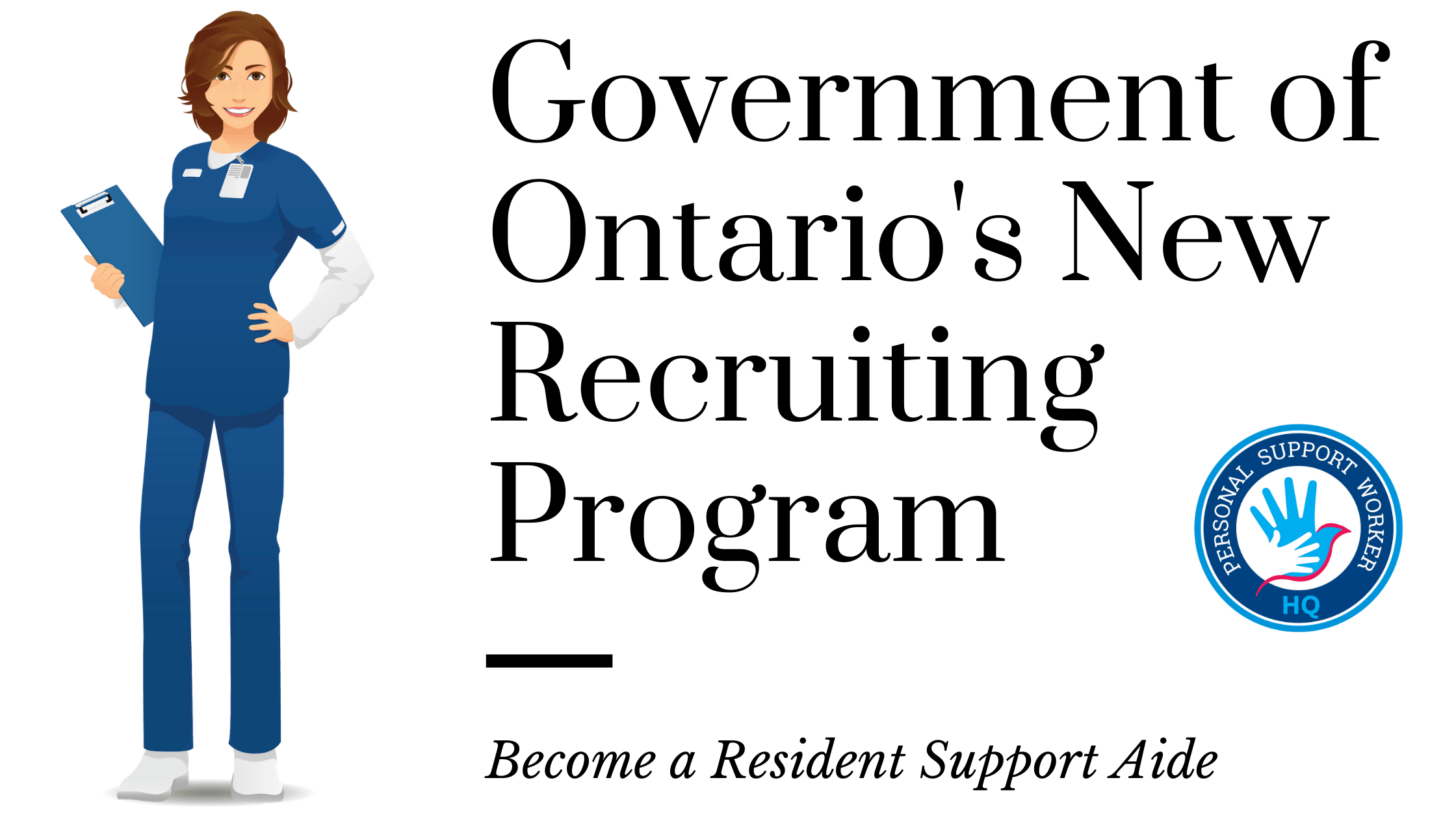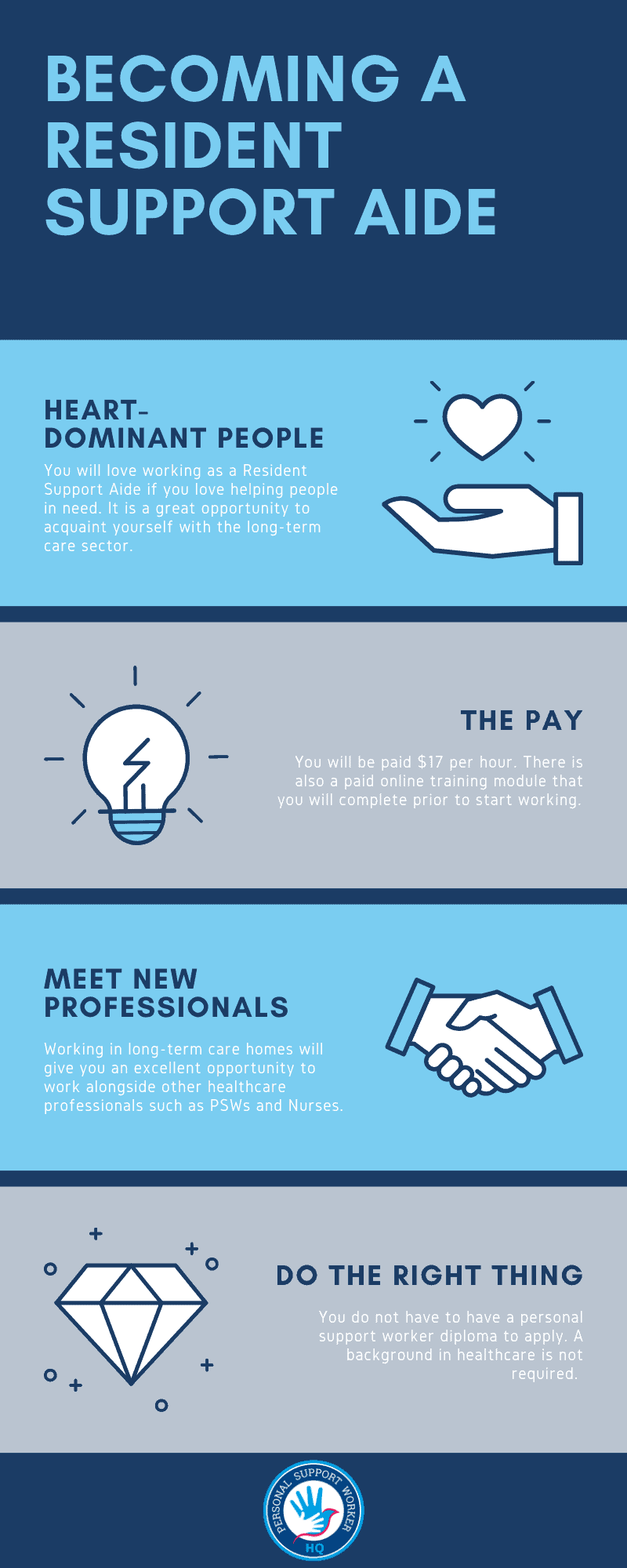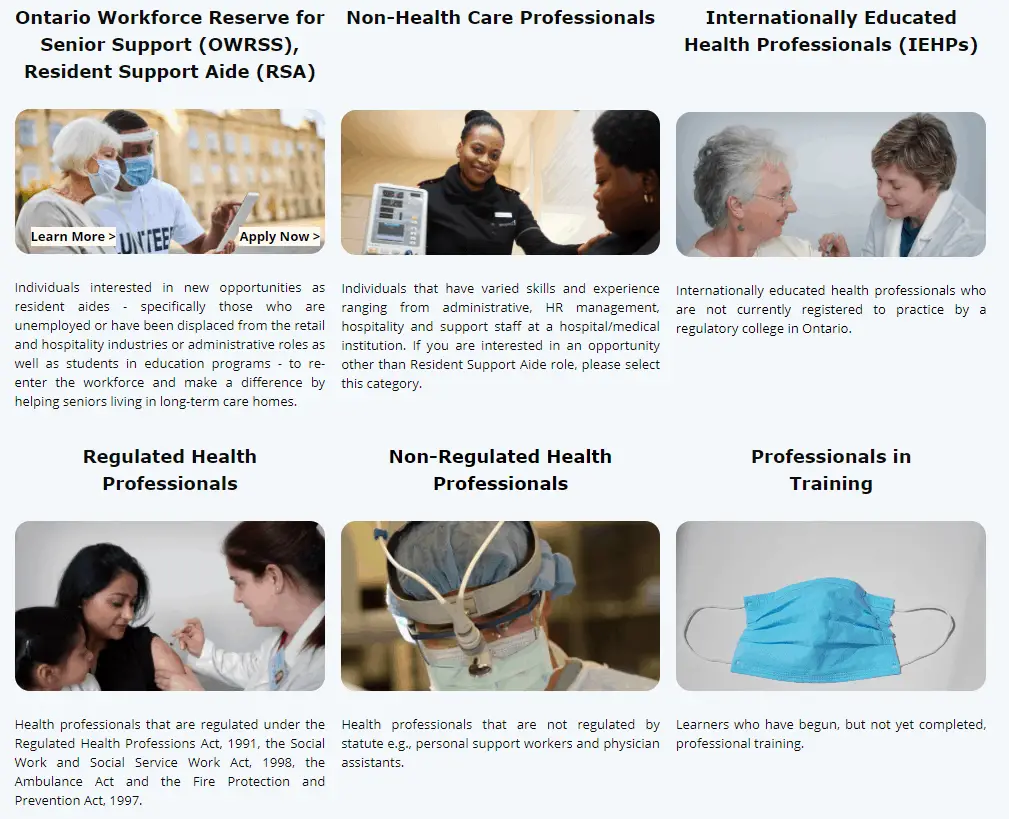
The Ontario Ministry of Health and Long-term Care announced back in November of 2020, the plans to increase support for the long-term care sector.
Long-term care homes across Canada are experiencing an ever-persistent shortage of care support for their elderly patients.
The new Resident Support Aide Ontario recruiting program is meant to alleviate the staffing shortage at long-term care homes.
What is This new Government Recruiting Program?
The “Ontario Workforce Reserve for Senior Support” has been created to recruit and train those who are called Resident Support Aides (RSAs) to assist residents in long-term care facilities during the COVID-19 pandemic and beyond.
Please note that this is not a program if you want to become a Personal Support Worker.
There are some key differences between a Resident Support Aide and a PSW.
If you would like to become a PSW, there are many free options.
Governments at various levels are also funding PSW programs.
Three major Government-funded programs are:
The Free Online PSW Training Program Funded by the Federal Government
The Free Accerlated PSW Training Program Funded by the Ontario Government
Click here to view further details and how to register.
The Free Program to Provide Education and Recruit 373 PSWs
The Michener Institute of Education at University Health Network is taking applications for the Resident Support Aide program through the Ontario Matching Portal.
Through this initiative, RSAs are being hired to work at facilities across the province of Ontario.
How Does it Work?
Anyone can apply to the program and become a Resident Support Aide.
The program is geared to peak the interests of those adults who are currently unemployed or displaced from the healthcare field, whether it’s in the professional or the academic realms.
You do not have to have a PSW diploma to apply. A background in healthcare is not required.
Internationally educated nurses (IENs) and other healthcare professionals who can legally work in Canada but are not registered with their respective regulatory bodies can also apply to this program and become resident support aide.
Before you can apply, you will have to set up an account and create your profile on the Ontario Matching Portal.
This is a great opportunity if you have been considering becoming a PSW.
Working as a resident support aide will give you an opportunity to work in long-term care homes.
Moreover, you will get to work along with other healthcare professionals such as personal support workers, nurses, physiotherapists, occupational therapists, and physicians.
You will need to provide your vulnerable screening check, a copy of your immunization record, and three professional references.
Where do Resident Support Aides Work?
Resident support aides under this Government initiative are hired by the following Ontario hospitals:
- University Health Network,
- The Ottawa Hospital,
- Trillium Health Partners and
- MacKenzie Health.
You will be assigned to work at the long-term care homes associated with these hospitals.
The current Resident Support Aide program includes the greater Toronto area, Ottawa, and the Region of Peel. There are plans to expand the program to other regions soon!
Is Hiring for Full-Time or Part-Time Positions?
The Ministry of Health classifies this position as “call-in”.
Essentially what it means is that you’ll be hired on an as-needed basis or casual.
You’ll be informed of your work schedule at some point during the hiring process.
Resident Support Aide Salary?
The pay is fairly competitive but not at par with the salary of personal support workers.
Resident support aides are currently hired to work at $17 per hour.
There is an initial paid online training component following which you’ll be eligible to work.
Resident Support Aide Job Description
As the job titles states, you will support the long-term care home residents in their routine activities.
Resident support aides’ duties differ from that of personal support workers’ job duties.
As a resident support aide, you will be expected to assist senior residents with activities of daily living and similar tasks that will help lighten the workload of other frontline staff so they can focus on treatment within their scope of practice.
Some of the task resident support aides are:
- Setting up meal trays,
- Distributing food and snacks,,
- Greeting visitors,
- Assisting residents with technology and recreation, and
- Stocking supplies.
In addition to the tasks listed above, you may also be required to do the following tasks:
- Assisting residents in dressing up,
- Helping to set up the TV or other electronic media, and
- Opening food containers.
Overall, the goal of a resident support aide is to provide comfort and communicate any needs of the residents to the registered members of the healthcare team such as Registered Nurses (RNs) or Registered Practical Nurses (RPNs).

The Hiring Process
Job applications are to be completed online using the Michener Institute of Education Ontario Matching portal (More on how to apply is at the end of this post).
Once you have submitted the application and been selected for the program, Wilson HCG will contact you.
Online Learning
Once you have been contacted by Wilson HCG, you will then begin the online learning module.
The online component of the program is approximately 15 hours and you will be paid to do your online learning.
You are expected to complete the online modules training within one week.
The online training received through the Ontario Matching Portal includes:
- Infection Prevention and Control,
- Using the Personal Protective Equipment (PPE), and
- An overview of long-term care homes and seniors care.
Once you have completed the paid online skills training, you will be matched to a long-term care unit where there is a need.
Placements depend on the need and capacity of the long-term care nursing homes in your region.
Currently, significant staffing shortages are in facilities located in Ottawa, Peel, and Toronto.
COVID-19 Testing Requirements
Resident support aides work with the vulnerable at the long-term care homes in Ontario.
Therefore, you are expected to undergo a COVID-19 test prior to your placement.
In addition, you will have to get a COVID-19 test done every two weeks for the duration of your employment.
Duration of Employment
The role of resident support aides is to assist the long-term care home staff during the COVID-19 pandemic.
You will be hired on an “as needed” basis.
How to Apply?
Resident support aide program applications are being accepted through the Michener Institute of Education at University Health Network.
If you’re interested in becoming a Resident Support Aide, click here to start your application.
Keep in mind that you will need to use the most recent version of Firefox, Chrome, or Safari. The above link to fill out the application is not compatible with Internet Explorer.
From the home page of the Ontario Matching Portal, choose “Individuals, I want to help” to proceed. Refer to the picture below.

You will then be presented with several options.
A brief description is provided under each category.
There are six different categories that you can choose to register:
- Ontario Workforce Reserve for SeniorSupport (OWRSS), Resident Support Aide (RSA),
- Non-Health care Professionals,
- Internationally Educated HealthProfessionals (IEHPs),
- Regulated Health Professionals,
- Non-Regulated Health Professionals, and
- Professionals in Training.

Choose the one that best applies to you.
Please note that if you are a PSW and would like to offer assistance as a resident support aide, you will choose the “non-regulated health professionals”.
If you have any questions or need assistance in completing your application, contact me (Avtar) at [email protected] and I will be happy to guide you through.
If you like the information and think someone will benefit from it, please spread the word.
You can share this information using one of the links at the top of the post.
Resources you’ll need to become a Personal Support Worker
On this page, you can find anything there is to know about how to become a PSW, how to succeed as one, and how to continue your education. This is the place to come to and look for all the PSW resources and information that you may need on your journey as a PSW.
PSW job interview questions
If you’re determined to pass your next PSW interview with flying colors, we’re here to help. PSWHQ have put together a thorough online guide with PSW interview questions and appropriate sample answers to these questions that hit the target, and are concise and supportive.
Performing well in the interview is just one part of many others needed to secure a PSW Job. First and foremost, you’ll need to have an impeccable résumé and cover letter in order to be called for an interview.
Guide to finding PSW jobs
After you have decided to become a PSW and completed the course you are now at a point to start looking for work. It is important that you explore all the jobs listed under different job titles, which is why you should go through our ultimate guide to finding PSW jobs.
We also help you find PSW job postings from hospitals, long-term care homes, and community and private settings.
Advertising with PSWHQ
Over the past few years, PSWHQ has achieved a dominant ranking in major search engines such as Google and Bing. As a result, we offer a limited number of advertising opportunities to individuals, colleges, companies, and organizations we see as a good fit for the unique audience of PSWHQ.
FAQs
1. What is a resident service worker?
A resident service worker is a person who provides services to residents of a long-term care facility. They may help residents with activities of daily living, provide social and recreational activities, or provide support and assistance with personal care.
2. What is the difference between PSW and CHW?
The difference between the two is that PSW stands for Personal Support Worker, while CHW stands for Community Health Worker. PSWs provide care to individuals in their homes, while CHWs work in the community to promote and improve the health of all residents.
3. Can you describe what a support worker does in an average shift?
A support worker helps people with disabilities live their lives as independently as possible. They may help with things like bathing, dressing, and cooking, or they may provide emotional support. In an average shift, a support worker might do things like help clients get to appointments or run errands. They might also work with clients to create goals and plans for their lives and help them achieve these goals.
4. Does a support worker do personal care?
A support worker can do personal care, but it depends on their job description and what their employer allows. Generally, support workers provide assistance with activities of daily living (ADLs), such as bathing, dressing, and toileting. They may also help with household tasks, like cooking and cleaning.
5. What are the different types of support workers?
There are many different types of support workers, but some of the most common are:
- Social workers help people who are struggling with personal or social problems. They may work with individuals, families, or groups.
- Mental health workers help people who are struggling with mental health issues. They may provide counseling, therapy, or medication management.
- Rehabilitation workers help people who have been injured or disabled to recover and regain their independence.







Great! I hope that I can help.
Hi, What I have to do for this process I am international student done with two nursing courses from Seneca College. Nursing leadership and management , Coronary Care Nursing. I have one year experience of PSW with Bayshore and Advanta.